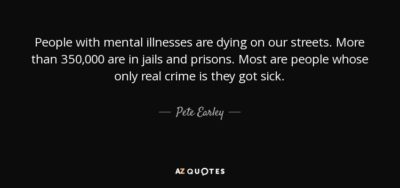
“If somebody had a heart attack, we wouldn’t wait until 99 percent of their heart was dead — we would get them care at the beginning of the problem, not at the end of the problem.” – Leslie Carpenter.
(8-17-20) Few subjects are as controversial in mental health as involuntary civil commitment.
When should society intervene?
This Friday – August 21- at 2 p.m. EST, I will be discussing civil commitment laws with Leslie Carpenter, a leading mental health advocate who was instrumental in reforming Iowa’s civil commitment criteria. We’ll be joined during the interactive webcast by co-hosts Janet Hays, director of Healing Minds NOLA, and Eric Smith, a national advocate with a serious mental illness.
You are invited to participate in the discussion electronically through two venues: Healing Minds NOLA or Eventbrite. There is no charge to participate.
If you have read my book, you are aware of what happened when I rushed my son, Kevin, to a local Fairfax, Va., hospital because he was delusional. Moments before, Kevin had asked me what I would do if someone I loved committed suicide and he’d told me that he was receiving secret messages through bumper stickers. After waiting four hours in a room away from everyone else, Kevin announced that there was nothing wrong with him and started to leave. I literally ran into the hallway and grabbed a doctor.
The doctor explained there was nothing he could do because Virginia’s civil commitment law required an individual to pose an “imminent danger.” Since we had been waiting peacefully for four hours, there was no immediate threat.
Kevin literally ran out of the hospital and forty-eight hours later was arrested after he broke into a stranger’s unoccupied house to take a bubble bath.
What happened to us was not some anomaly. Hundreds of other parents, siblings, friends and spouses have shared stories with me about the dangerous requirement that has contributed to a loved one becoming homelessness or getting arrested and ending up in jail. I’ve also heard from individuals who have been hospitalized against their will and have been traumatized. Some have lost jobs because of involuntary hospitalizations, others stuck with medical bills that they didn’t want.
How can we better navigate the tricky tightrope that protects someone in crisis from being abused but also allows those who love them to intervene when necessary? What is a more reasonable standard than waiting for someone to become violent, which harms them, others, and portrays individuals with mental illnesses in the most negative ways?
Please join the discussion this Friday as we examine alternatives to dangerousness and common sense changes that states are making.
Background:
More about Leslie Carpenter from Healing Minds NOLA website:
Leslie Carpenter is a powerful mental health advocate from Iowa where she and her husband Scott work to improve the treatment of people with serious mental illnesses in their home state and across the United States. The Carpenters are parents to a son who has been repeatedly hospitalized for schizoaffective disorder. 
In an article from 2018 – Parents praise new Iowa mental health commitment law; critics fear loss of civil rights – Leslie and Scott discuss their work to help lead a successful effort to change Iowa’s mental health commitment law.
“The change is designed to bring prompt, court-ordered treatment to people such as Carpenter’s son, who goes off his medication and falls back into dangerous delusions after he’s released from the hospital.
“If somebody had a heart attack, we wouldn’t wait until 99 percent of their heart was dead — we would get them care at the beginning of the problem, not at the end of the problem,” Carpenter said. “If somebody is deteriorating with their mental health, it’s really scary to sit there and hope you’re going to catch them at just the right moment before they hurt themselves, or before they even, God forbid, hurt somebody else.”
Learn more about their work on their website: Iowa Mental Health Advocacy
In a report by the Treatment Advocacy Center, 22 states have modified their civil commitment standards to allow interventions before someone living with untreated, or under-treated, serious mental illness must meet the high bar of dangerousness or grave disability.
Here is Healing Minds Nola’s press invitation for you to participate in the webcast entitled “Focus on Severe Mental Illness: Reforming Civil Commitment Laws.”
|
|||||||
|
|||||||
|
CRAZY: A Father’s Search Through America’s Mental Health Madness, a Pulitzer Prize Finalist for Nonfiction.





